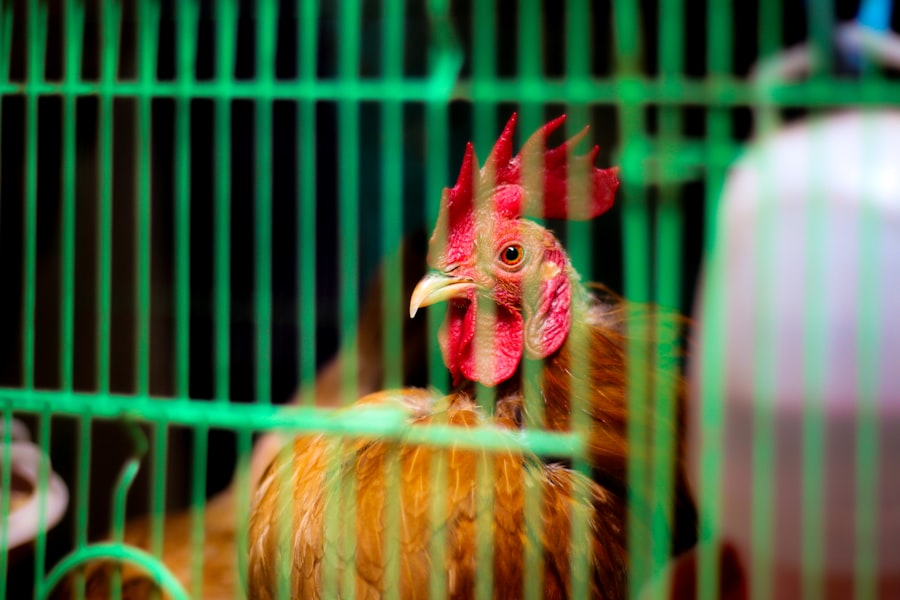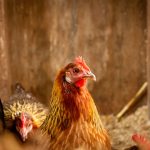Keeping backyard chickens in Australia offers numerous benefits. Primarily, it provides a consistent source of fresh, organic eggs, potentially reducing grocery expenses and ensuring access to high-quality, nutritious produce. This practice also serves as an educational opportunity for both adults and children, fostering lessons in responsibility, animal care, and sustainable living.
Chickens contribute to household sustainability by consuming kitchen scraps, thereby reducing food waste. They also produce valuable fertilizer for gardens. Additionally, these birds aid in natural pest control by eating insects and bugs, which can decrease reliance on chemical pesticides.
Backyard chickens can also enhance quality of life. Known for their sociable nature, chickens often become beloved pets with distinct personalities. Observing their behaviors and interactions can be both entertaining and relaxing.
The routine of caring for chickens may provide therapeutic benefits and stress relief for their keepers. Furthermore, chicken-keeping can foster community connections. It presents opportunities to share eggs with neighbors, exchange knowledge with fellow enthusiasts, and participate in local poultry-related events.
This hobby can contribute to a more self-sufficient and sustainable lifestyle while also providing companionship and social engagement.
Table of Contents
- 1 Choosing the Right Breed of Chicken for Your Backyard
- 2 Building a Coop and Providing a Safe Environment for Your Chickens
- 3 Feeding and Caring for Your Backyard Chickens
- 4 Health and Disease Prevention for Your Flock
- 5 Harvesting and Using Fresh Eggs from Your Backyard Chickens
- 6 Legal Considerations and Regulations for Keeping Chickens in Australia
- 7 FAQs
- 7.1 What are the benefits of keeping backyard chickens in Australia?
- 7.2 What are the legal requirements for keeping backyard chickens in Australia?
- 7.3 What are some common challenges of keeping backyard chickens in Australia?
- 7.4 What are some important considerations for housing and caring for backyard chickens in Australia?
- 7.5 What are some popular chicken breeds for backyard chicken keeping in Australia?
Key Takeaways
- Keeping backyard chickens in Australia can provide a sustainable source of fresh eggs, natural pest control, and a rewarding hobby for the whole family.
- When choosing the right breed of chicken for your backyard, consider factors such as climate, space, and egg production to ensure a good fit for your environment.
- Building a coop and providing a safe environment for your chickens is essential for their well-being, including protection from predators and access to fresh water and proper ventilation.
- Feeding and caring for your backyard chickens involves providing a balanced diet, regular health checks, and proper handling to ensure their happiness and productivity.
- Health and disease prevention for your flock requires regular cleaning of the coop, vaccination if necessary, and monitoring for signs of illness to maintain a healthy environment for your chickens.
- Harvesting and using fresh eggs from your backyard chickens can provide a nutritious and delicious addition to your meals, as well as an opportunity for sharing with friends and neighbors.
- Legal considerations and regulations for keeping chickens in Australia vary by location, so it’s important to research and comply with local laws and ordinances to avoid any potential issues.
Choosing the Right Breed of Chicken for Your Backyard
Climate and Environment
The climate and environment in which you live are crucial considerations. In a country like Australia, where climates range from tropical in the north to temperate in the south, it’s essential to choose a breed well-suited to your specific region. For instance, if you live in a hot and humid area, breeds known for their heat tolerance, such as Australorps or Rhode Island Reds, may be ideal. Conversely, if you live in a cooler climate, breeds that are more cold-hardy, like Orpingtons or Wyandottes, may be a better fit.
Egg-Laying Capabilities
Another vital factor to consider is the breed’s egg-laying capabilities. If you’re primarily interested in keeping chickens for their eggs, breeds known for their high egg production, such as Leghorns or Sussex, may be the way to go. However, if you’re more interested in raising chickens for meat, dual-purpose breeds that excel in both egg-laying and meat production, like Plymouth Rocks or Australorps, could be the better choice.
Ornamental Value and Other Considerations
Some people may be drawn to keeping chickens for their ornamental value, in which case breeds with unique plumage or distinctive physical characteristics, such as Silkies or Polish chickens, may be the perfect fit. Ultimately, the right breed for you will depend on your specific needs and preferences.
Building a Coop and Providing a Safe Environment for Your Chickens
Building a coop and providing a safe environment for your backyard chickens is essential for their health and well-being. When constructing a coop, it’s important to consider factors such as size, ventilation, and predator protection. The coop should provide at least 2-3 square feet of space per chicken, as well as roosting bars and nesting boxes for them to lay their eggs.
It should also have good ventilation to prevent moisture buildup and ensure good air quality. Additionally, the coop should be secure and predator-proof to protect your chickens from potential threats such as foxes, raccoons, or birds of prey. This may involve using sturdy materials, adding locks to doors and windows, and installing fencing or wire mesh around the perimeter.
In addition to the coop, it’s important to provide a safe outdoor environment for your chickens to roam and forage. This may involve creating a secure outdoor run or free-ranging area that is protected from predators and provides access to fresh grass, insects, and sunlight. It’s also important to provide adequate shelter from the elements, such as shade from the sun and protection from wind and rain.
Furthermore, it’s important to regularly inspect the coop and outdoor area for any potential hazards or signs of wear and tear, such as loose wires, sharp edges, or toxic plants. By providing a safe and comfortable environment for your chickens, you can help ensure that they lead happy and healthy lives.
Feeding and Caring for Your Backyard Chickens
Feeding and caring for your backyard chickens is an important aspect of keeping a healthy flock. Chickens require a balanced diet that includes a combination of commercial feed, kitchen scraps, and access to fresh water. When choosing commercial feed, it’s important to select a high-quality feed that is appropriate for the age and purpose of your chickens (e.g., laying hens vs.
meat birds). Additionally, it’s important to provide access to grit and oyster shell to help with digestion and eggshell formation. In addition to commercial feed, chickens can also benefit from kitchen scraps such as fruit and vegetable peels, bread crusts, and cooked grains.
However, it’s important to avoid feeding them foods that are toxic or harmful to their health, such as chocolate, avocado, or raw beans. In addition to feeding, caring for your backyard chickens also involves providing regular health checks and basic maintenance. This may involve monitoring their behavior and appearance for signs of illness or injury, as well as regularly cleaning the coop and nesting boxes to prevent the buildup of waste and bacteria.
It’s also important to regularly collect eggs to prevent them from becoming dirty or broken. Furthermore, providing enrichment activities such as dust baths, perches, and toys can help keep your chickens mentally stimulated and physically active. By providing proper nutrition and care for your backyard chickens, you can help ensure that they lead happy and healthy lives.
Health and Disease Prevention for Your Flock
Maintaining the health of your flock and preventing disease is crucial for the well-being of your backyard chickens. One important aspect of disease prevention is biosecurity measures, which involve implementing practices to reduce the risk of introducing or spreading diseases within your flock. This may involve measures such as quarantining new birds before introducing them to your existing flock, limiting visitors to your coop and run area, and regularly disinfecting equipment and footwear.
Additionally, it’s important to practice good hygiene by washing your hands before and after handling chickens or their eggs. Another important aspect of maintaining flock health is vaccination and parasite control. In Australia, there are several common diseases that can affect chickens, such as Marek’s disease, infectious bronchitis, and coccidiosis.
It’s important to work with a veterinarian or poultry health professional to develop a vaccination program that is appropriate for your specific region and circumstances. Additionally, regular deworming and parasite control measures can help prevent infestations of internal and external parasites such as worms, mites, and lice. Furthermore, it’s important to monitor the health of your flock on a regular basis by observing their behavior, appearance, and egg production.
Signs of illness in chickens may include lethargy, decreased appetite, abnormal droppings, respiratory symptoms, or changes in egg quality or quantity. If you notice any concerning signs or symptoms in your flock, it’s important to seek veterinary advice promptly in order to diagnose and treat any potential health issues. By implementing biosecurity measures, vaccination programs, parasite control measures, and regular health monitoring, you can help maintain the health and well-being of your backyard flock.
Harvesting and Using Fresh Eggs from Your Backyard Chickens

Handling Eggs with Care
It’s also important to handle eggs with care in order to prevent contamination with bacteria or pathogens. This may involve gently wiping off any dirt or debris with a dry cloth rather than washing them with water.
Culinary Delights
Once you have harvested fresh eggs from your backyard chickens, there are countless ways to enjoy them in cooking and baking. Fresh eggs can be used in a wide variety of recipes such as omelets, quiches, frittatas, cakes, cookies, custards, and more. They can also be used to make homemade mayonnaise or salad dressings. The vibrant yolks of fresh eggs can add rich color and flavor to dishes while providing essential nutrients such as protein, vitamins, minerals, and healthy fats.
DIY Projects and Beyond
In addition to culinary uses, fresh eggs from backyard chickens can also be used in various DIY projects around the home and garden. For example, eggshells can be crushed and added to compost or used as a natural fertilizer for plants due to their calcium content. Eggshells can also be used as seed starters or pest deterrents in the garden. Furthermore, eggshells can be used as a natural abrasive cleaner for pots and pans due to their gritty texture. By harvesting fresh eggs from your backyard chickens and finding creative ways to use them in cooking, baking, gardening, and cleaning projects, you can fully enjoy the benefits of keeping a flock.
Legal Considerations and Regulations for Keeping Chickens in Australia
Before keeping backyard chickens in Australia, it’s important to be aware of the legal considerations and regulations that may apply in your area. The regulations regarding keeping chickens can vary depending on factors such as location (e.g., urban vs. rural), property size, zoning laws, homeowners’ association rules (if applicable), and local council bylaws.
In some areas, there may be restrictions on the number of chickens you are allowed to keep or specific guidelines regarding coop size and placement. It’s important to research the specific regulations that apply in your area before getting chickens in order to ensure compliance with local laws. This may involve contacting your local council or government authority responsible for animal welfare or agriculture for information on relevant regulations or permits that may be required.
Additionally, it’s important to consider factors such as noise regulations (e.g., crowing roosters), waste management (e.g., composting manure), odor control (e.g., regular coop cleaning), and neighbor relations when keeping backyard chickens. By being aware of legal considerations and regulations for keeping chickens in Australia, you can help ensure that you are keeping chickens responsibly within the parameters of local laws while being considerate of neighbors and community standards. It’s also important to stay informed about any updates or changes in regulations that may affect your ability to keep chickens in the future.
By following legal guidelines and being a responsible chicken keeper, you can enjoy the many benefits of keeping backyard chickens while being a good steward of animal welfare and community harmony.
If you’re considering keeping backyard chickens in Australia, you’ll want to make sure you have a suitable chicken coop and nest box. Poultry Wizard offers a helpful article on chicken coop and nest box essentials to ensure your feathered friends have a comfortable and safe living space. Additionally, Poultry Wizard provides a range of resources and products for keeping chickens, including their innovative SnapLock chicken coop.
FAQs
What are the benefits of keeping backyard chickens in Australia?
Keeping backyard chickens in Australia can provide a sustainable source of fresh eggs, natural pest control, and a source of organic fertilizer for gardens. Additionally, chickens can be a source of entertainment and companionship.
What are the legal requirements for keeping backyard chickens in Australia?
The legal requirements for keeping backyard chickens in Australia vary by state and local council. Generally, there are regulations regarding the number of chickens allowed, coop size and placement, and hygiene standards. It is important to check with local authorities before starting a backyard chicken flock.
What are some common challenges of keeping backyard chickens in Australia?
Common challenges of keeping backyard chickens in Australia include predators such as foxes and birds of prey, disease management, and ensuring proper nutrition and care for the chickens. Additionally, noise and odor concerns may arise in urban or suburban areas.
What are some important considerations for housing and caring for backyard chickens in Australia?
When housing and caring for backyard chickens in Australia, it is important to provide a secure and predator-proof coop and run, access to fresh water and a balanced diet, and regular health checks. Proper ventilation, protection from extreme weather, and space for exercise are also important considerations.
What are some popular chicken breeds for backyard chicken keeping in Australia?
Popular chicken breeds for backyard chicken keeping in Australia include the Australorp, Isa Brown, Rhode Island Red, and Plymouth Rock. These breeds are known for their egg-laying abilities, docile temperaments, and suitability for Australian climates.
Meet Walter, the feathered-friend fanatic of Florida! Nestled in the sunshine state, Walter struts through life with his feathered companions, clucking his way to happiness. With a coop that’s fancier than a five-star hotel, he’s the Don Juan of the chicken world. When he’s not teaching his hens to do the cha-cha, you’ll find him in a heated debate with his prized rooster, Sir Clucks-a-Lot. Walter’s poultry passion is no yolk; he’s the sunny-side-up guy you never knew you needed in your flock of friends!







